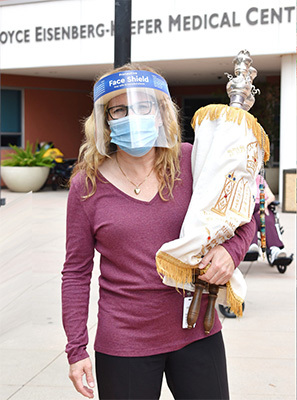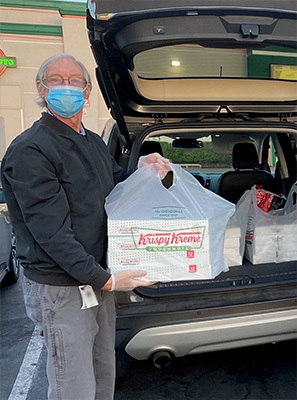Rabbis’ Help and Counsel Providing Daily Support and Encouragement at the Los Angeles Jewish Home


Rabbis’ Help and Counsel Providing Daily Support and Encouragement at the Los Angeles Jewish Home

Building community is hard work—keeping it strong can be even more challenging, especially during a global pandemic, when health and safety limit person-to-person contact and relegate social interactions to virtual experiences such as Zoom and phone calls. Fortunately, the Los Angeles Jewish Home has a secret weapon: its warm, dedicated, dynamic clergy, who continue to engage, stimulate, comfort, and nurture Jewish Home residents and their families.
The key to the job, says Rabbi Karen Bender, Skirball director of spiritual life at the Jewish Home, is always pushing for excellence. "These can be challenging times for everyone, but it's incumbent upon us to summon energy, creativity, and enthusiasm because our residents deserve the very best," she says.
For Bender and her colleague Rabbi Ron Goldberg, rabbi of the Eisenberg Village campus, that means being creative and intentional about infusing daily life with meaning. "The question we've been asking ourselves is, 'Without physical gatherings, how can we still enrich and bring spiritual depth to our residents' lives?'" Rabbi Bender says. "The answer is by staying true to our north star: putting in every effort to make a difference where we can."
Rabbi Bender's approach translates to seeking new opportunities for Jewish Home residents to increase their fulfillment and to maximize their enjoyment of each day. "We had a resident who needed a new mezuzah [a small scroll affixed to the doorpost of Jewish homes], so I got permission to go to her room. I stood outside of her door and hung the mezuzah, and as we said the blessing, our eyes made contact with one another through our PPE," she says. "I wasn't allowed to linger there, so I left, and we immediately got on the phone to chat. It was a beautiful experience because it acknowledged the importance of her Judaism and also showed her that the Jewish Home loves and cares for her."
Stories like these, says Rabbi Bender, highlight a small silver lining amidst pandemic life: an emphasis on even more personalized care. "One-on-one is a big theme for us," she notes. "Since we can't get together in groups, Rabbi Ron and I need to be more dialed into what individual residents want and need."
She offers another case in point. "During Chanukah, I passed by a resident's room and waved, and she called out to me, telling me how sad she was to have reached the seventh night of the holiday without touching a menorah with her own hands," she recalls. "I went home and found an extra one of mine, which I sanitized and gave to a nurse to deliver. I then called the resident on the phone and waited with her until she received my package, at which point we both lit our menorahs and said the blessings. In some ways, I think it meant more to her than if we had gotten together with a whole group of other residents because this was just about her. During our call, she was so moved, she started to cry."

Rabbi Goldberg has been teaching residents over the phone, typically focused on topics like Shabbat and the Torah. Rabbi Bender recites the Kaddish memorial prayer and lights Yahrtzeit candles with residents by phone, as well. "Once we accepted our limitations in terms of what we can't do right now, it freed us up to focus on all the ways we can still connect with residents—and there are a lot of them," she says.
The upcoming holiday of Tu B'shevat (on January 28), also known as "the New Year of the Trees," offers one example. "Rabbi Goldberg and I are creating a broadcast to go out over the Jewish Home's closed circuit television," she says. "We're going to do a fruit tasting with residents— they're going to get a delivery of seedless figs, mangos, tangerines, and grapes, as well as two different grape juices. So while we're eating the fruit on camera, they'll be able to do the same alongside us from the comfort of their rooms. We're also planting a tree on each campus. When it's safe for them to do so, residents can come out and help water and care for them. Our goal is for each resident to feel seen, heard, and loved."
In addition to caring for residents, the rabbis also help minister to Jewish Home staff. "The work ethic at the Jewish Home is amazing. People here do more than just show up; they really give it their all, every day," Rabbi Bender says. "So taking care of the staff is a critical part of serving our whole community."
Last fall, in coordination with the Human Resources Department, Rabbi Bender organized a healing service for Jewish Home staff, inviting a minister, a priest, and Muslim and Buddhist religious leaders to participate. "We're a diverse crew, honoring all denominations, so I wanted the service to reflect that," she says. "It gave us an opportunity to talk about healing from an interfaith perspective."
More recently, the rabbis have been counseling staff who are fearful of taking the COVID-19 vaccine. "Some people say they don't need it because everything is in God's hands," Rabbi Bender says. "I try to help them see that faith in God and in the vaccine can be mutually compatible."
Rabbi Goldberg has also been helping staff and residents fill out vaccine consent and authorization forms. "It's not something you'd typically think of as part of a rabbinic job, but it can be enormously comforting for our residents and staff to have us by their side as they prepare to do something new," he says. "Just being present is so important because we're able to tell them that what they're feeling is legitimate—and that we can face it together."
With such an extensive list of things to do, the days are long for Rabbi Bender and Rabbi Goldberg— but they are keeping their heads up. "Our residents at the Jewish Home are just incredible," Rabbi Bender says, "and all of us staff are privileged to be doing our part to support them, especially during these challenging times."